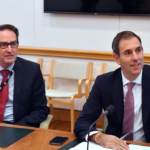Covid-19: Engaging our leadership, our humanity, our values

It’s early in the morning. I sit on my deck, barefooted typing away. The bird song is all I can hear. The cockatoos are dive bombing in the valley, while the kookaburras watch and occasionally laugh. My dogs (pictured below) are at my feet doing what they do best: one sleeping and one chewing on a bone.
My partner, who is kind, gentle and loving, is asleep. I sip freshly-made coffee and eat the delicious bircher muesli with yoghurt and blueberries that I made yesterday.
Attached to this deck is our home. While it could do with some repairs, we have clean running hot and cold water, electricity, gas and plumbing that works, access to the NBN (that works sometimes and mobile data when it doesn’t), we have savings against our mortgage and enough security that we aren’t going to lose it anytime soon.
I have a family who love me, an excellent education and have been with the same employer for over 15 years (albeit in different roles). Just for a moment, just a moment, it would be easy to think the only thing there was to worry about were the mozzies biting my ankles.
But I’m acutely aware that this is what privilege looks like. And acutely aware that the world is disrupted and fundamentally changing. What worries me is not just the situation unfolding and the future we have in store, but our starting point.
Before COVID-19 (BC-19)
For decades Before COVID-19 (let’s call it BC-19 for short), we continuously left people behind and created a yawning gap between our economic prosperity and our social and environmental progress.
The Social Progress Index internationally shows this at a global level. At a national level there are reams of data bearing witness to the large and growing gaps between the ‘have lots’, ‘haves’, ‘have nots’ and ‘never hads’.
In Australia alone, despite almost three decades of unprecedented economic growth, here’s what society looks like at BC-19:
- Shelter: 1 in 200 are homeless on any given night and 3 out of every 5 low income households are in financial housing stress.
- Work: 5.1% of the workforce are unemployed and 8.6% are under employed (ABS, Feb 2020), wage growth did not keep up with inflation between 2014-2018 and was low in 2019, and around 24% do not have access to paid leave entitlements (new ABS data due 26 March 2020).
- Money: 1 in 10 (2.1 million) people in the population are in severe or high financial stress (1 in 2, approximately 209,242 Indigenous people); Almost 1 in 2 (44%) do not have 3 months of savings; 1 in 5 can’t get $2,000 in a week for an emergency; 13.6% are living below the poverty line (50% median income), including 774,000 children (17.7%) and 424,800 young people (13.9%; ACOSS, 2020).
- Internet: Digital exclusion remains pervasive with the most recent ABS data (2018) found more than 2.5 million people across Australia were not online and many struggle with affordability and digital ability.
- Food: A recent WA study of families living in entrenched disadvantage found 80% couldn’t access and afford quality food that met nutritional needs without having to rely on emergency food programs.
- Domestic and family violence: 2.2 million people (1 in 6 women and 1 in 16 men) have experienced physical and/or sexual violence from a partner and 3.6 million have experienced emotional abuse from a partner (1 in 4 women and 1 in 20 men).
- Mental health: One in five 16-85-year-olds and one in seven 4-17-year-olds experience a mental health disorder in any given year.
- Disability: One in five have a disability. They are much more likely to experience higher rates of psychological distress and poorer physical health, employment and income levels than those without a disability (read the implications re COVID-19).
- Indigenous Australians: We have failed to close the gap between our indigenous and non-indigenous Australians in many areas.
- Australia’s Social Progress by State/Territory: Our economic growth has not matched the social or environmental progress in our States and Territories across Australia.
We have a not-for-profit sector who do critically important work in the delivery of human services and in the functioning of society (they employ almost 1.3 million people and have over 3.3 million volunteers) but they are struggling to survive with underfunded services, cross subsidisation, a culture where donors don’t want to pay for overheads that charities need to do their job well, which has left them with inadequate equipment and a lack of investment in their capacity to respond in times like these.
We have a social security system that has left many people below the poverty line (unemployment payments have had no real growth for over two decades) and in a cycle of mutual obligation where the obligation side is almost impossible to meet if you’re long-term unemployed and experiencing any complexity in your life.
I’ve asked before, and I need to ask again, “What good was all this economic growth if we can’t breathe, don’t have shelter, don’t have access to information, education or the opportunity to reach our potential?”
During COVID-19 (DC-19)
The point is, that BC-19, our system created significant numbers of people in our society who are vulnerable. History has taught us that During COVID-19 (DC-19) we should expect the number of people in this group to increase substantially, and their situation will become more dire.
And we also know that After COVID-19 (AC-19), the recovery will be slow and that it is this group who will take the longest to bounce back – if in fact, they ever do.
People who have never known what it’s like to lose and not be able to find a job, to not have stable housing, to not be able to get enough to eat for their families, to not be able to access urgent life-saving medications or medical care, who have never known what it feels like to not be able to breathe properly are going to be exposed to challenges and experiences that they could only have imagined (if they’d entertained it) in DC-19.
As a social military historian, I’ve always been captured by how monumental events in our world have such fundamental social, economic, health, political and legal and technological implications for society. The world wars and the Great Depression all fundamentally changed society and people’s lives.
The historian in me says that we are on the precipice of the most significant shift globally with COVID-19 since the Second World War. Instead of being at war with each other as countries, with DC-19 we are at war with a virus that threatens to kill a significant number of us and drastically disrupt our lives.
Shaping DC-19 and transitioning to After COVID-19 (AC-19)
The historian in me, who is fighting with the social justice warrior in me really hopes I’m wrong, because I know how much suffering accompanies these fundamental shifts. The social justice warrior in me is fighting with the social policy scholar in me who is hoping that this is the urgent crisis we need to hit a reset for society, so we have the chance of creating a better world AC-19.
That this is the crisis we need to wake up as a society and find a way to ensure that our economies and societies are structured in a way that everyone has a right to safe, stable housing, that they have enough food to feed their families, that they have access to decent health care, that people have the opportunity to be educated, to work, to have friends and families that they can spend quality time with, to live to their full potential.
The world is fundamentally changing around us. While this is frightening, we cannot forget for a moment that we are both witnesses and actors in this seismic shift.
This is going to be bigger than any of us – as individuals, communities, organisations or political systems – could have imagined and much of it will be beyond our control. But, as actors, in this significant chapter of history, we should not underestimate our roles, our actions and the power in them.
What we do – engaging our leadership, our humanity, our values – will help shape what happens next. It will determine not just what happens During (DC-19) but also After (AC-19).
Difficult decisions are going to need to be made. People will be disappointed. People will have to give things up. People will disagree. People will be frightened and anxious. People will not always make the right decisions.
Markets will fail. Governments will need to step in and step up in monumental ways and beyond the current stimulus packages (in Australia, worth $189 billion or around 10 per cent of the size of GDP as at 22 March 2020). Charities will need to bring their best to support the most vulnerable, but they will need to be substantially supported.
We need governments, philanthropists and donors to continue to support our charities. We need to think about our supply chains and support our social enterprises. We need to protect sectors that we value. We need board members and leaders of businesses, to be mindful of who they hire and fire, who their supply chains are, and how they support people in hardship (who can’t pay mortgages or rents or utility bills).
As individuals, we can all think about how we reach out to our family and friends, how we spend our money, how we support our neighbours, how we share the resources we have, how we create new forms of social connectivity when we can’t go to the gym, the choir, museums, theatres, bars and restaurants together.
We need people who can be social connectors and build culture in new ways. We need to express our humanity and love with words and actions, rather than warm embraces.
We can hold judgement and not assume the worst in people. We can’t know what else is going on in someone’s life (who has just lost their job, whose partner or child is sick, who has significant underlying health conditions that we can’t see, who is experiencing domestic and family violence, who is juggling kids at home from school or childcare and jobs, who is feeling socially isolated, who is highly anxious, who has lost loved ones). We can speak up and not be complicit.
We can value and be kind to the people in society with the most important jobs in the world – those who care for our sick, our elderly, people with disabilities and our children, those who make sure we eat (our farmers, our truck drivers, our supermarket workers), those who pick up our rubbish, who keep our power going and our water clean.
This won’t be easy. At times (including for me), it’s going to feel like we’re drowning, like we have no idea what to do next, like the world is moving at a pace that we can’t control or know what’s going to happen, like we’re trying to reassure others while internally we’re struggling to reassure ourselves.
All we can do is make the best decisions we can in the circumstances we’re faced with. While we cannot predict the future, now, more than ever we need leadership that is responding to the immediacy of crisis and who are setting direction, protection and order for a more secure future.
We need leaders who recognise that BC-19 wasn’t ok; that we can help shape DC-19 and set plans in place for a better future AC-19. We need leaders who are responsive, adaptive and courageous and who hold humanity at their core.
These are difficult times. Be generous, be kind, be the leader you wish you had and take a moment to breathe.
For now, for me, the birds and the bush are calling and I’m holding onto hope. Hope that we will show the best of ourselves in DC-19 and choose to create a new path in AC-19 – one with a better, brighter future for all.
This article was published by the Society for Social Impact.
Professor Kristy Muir is the CEO of the Centre for Social Impact and a Professor of Social Policy at UNSW Sydney. She has worked for more than two decades with for-purpose organisations to help understand, measure, and find innovative solutions to complex social problems.











